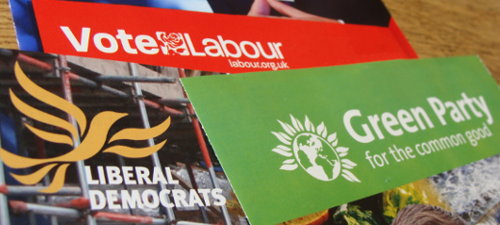Unless Boris Johnson has his way, the next general election is likely to come much sooner than planned (Walker et al, 2016). Upon resigning, Prime Minister David Cameron called for a new Conservative leader to be elected in time for the party conference in October.
That would put a new election in November, at the earliest. Yet that timetable has been pushed up - maybe due to pressure from other EU members who want the British exit resolved soon. The new aim for electing a Conservative leader now seems to be September, which could put an election as soon as October.
With the Tories split, with the country split, and with some clear rallying points appearing - not least a sudden sparking of pro-European sentiment and campaigns pushing back at intolerance and ethnically-charged abuse - it would seem to be a golden opportunity for Labour and for progressive parties in general.
A progressive alliance - a pact focussing the electoral efforts of progressive parties from Labour to the Greens to the Liberal Democrats against the Conservatives and UKIP, rather than each other - is surely more likely now than it ever has been. The situation is critical and need for solidarity is great.
Yet at precisely this point, Labour's Right-wing decided it had tolerated Jeremy Corbyn's leadership quite long enough (MacAskill et al, 2016). In a matter of hours, Labour had fallen into so deep and disreputable a mess that party supporters of even the most deep convictions where sleepless with anxiety that the party's complete ruin was imminent (Jones, 2016).
So divided is Labour, it seems now that the two sides are reduced to squabbling over who gets to keep the name and history - even as the party itself appears to be little more than a hollow and decaying husk.
If the MPs successfully topple the leadership, with Angela Eagle appearing to be the challenger (BBC, 2016), it would alienate the membership and almost certainly trigger an exodus. The Left of the party waited too long to put its candidate forward and is unlikely to want to wait around through another Blairite New Labour experiment (Hinsliff, 2016).
However, despite the doom and gloom, it could be that a Labour split could be exactly the catalyst that is needed for the Left. For a long, long time the Labour Party has dominated the progressive wing of politics, squeezing out any alternatives and campaigning forcefully for themselves as the only progressive alternative - a power obsessed position that make an pact with other parties unlikely.
Yet Labour has now learned some stark lessons. Its connection with its old heartlands has been shattered, possibly irreparably. It chance of winning a majority has been drastically cut by its loss of support in Scotland. And the trust between the party's wings seems to have been broken. In such realisations lie the fire and motivations to finally push on and make positive changes, if it can be seized.
If the Left and Right-wings split, these lessons must surely lead to an electoral pact between them to avoid immediate competition that would only inflict further damage by splitting support in the constituencies (Jones, 2016{2}). Such a pact could form the ideal base for a broader progressive alliance.
With the Momentum movement, Corbyn and whatever MPs remain his allies, and the trade unions rallying around, for instance,
Left Unity - a party almost ready made for such a Left Labour breakaway - and the Labour Right as something along the lines of the
Democratic Party in Italy or America, or
New Democrats as in Canada, the argument for getting the main progressive parties cooperating would be impossible to ignore.
It would be much easier to imagine Left Unity and the Democrats being convinced to work alongside the Liberal Democrats and the Greens towards the common goal of defeating the Conservatives in England than would convincing Labour to put aside its majority ambitions - it might even be convinced to work with Plaid Cymru in Wales and the SNP in Scotland.
The Liberal Democrats and the Greens both campaigned strongly for the Remain side in the referendum, with the Lib Dems in particular seeing a boost in support, identifying themselves closely with the post-referendum pro-Europe outpourings (Chandler, 2016) - with its Lib Dem Fightback now seeing membership rise to 70,000, higher even than in 2010 (BBC, 2016{2}).
Both parties have shown themselves willing and able to work with other parties on the Left. In Wales, the Lib Dems are currently in coalition with Labour and the Greens have been arguing since the 2015 election for the building of a progressive alliance to end the damaging splitting of the progressive vote that helps Conservatives win (Lucas, 2015).
In the aftermath of a disastrous 2015 election and a country-dividing referendum, progressives need a positive mindset more than ever. While the breaking of the Labour Party would be as painful for many as the referendum result, there is a need to look even at a split in such a historically consequential party in a positive light.
The division of one creaking edifice of a party could be the spark that ignites a much broader progressive unity. If it leads to better relations on the Left, to more cooperation and on better terms, to a pact and an alliance that brings progressives together to advance, and to defend, the most important of causes, then even a party as significant as Labour is just a party, a means to and end, not an end in itself, whose interests should not be put above those aims for which it was formed to achieve.


